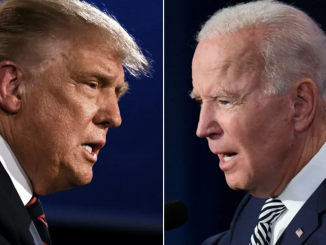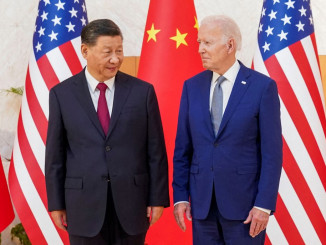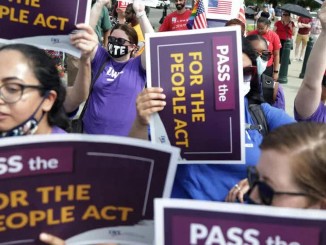
Nov. 20, 2023 by Juan García of Prensa Obrera (Workers Press), newspaper of the Argentine revolutionary socialist Partido Obrero (Workers Party), translated by Speak Out Now. Some readers may need additional background information on Argentine politics. We are providing links to other articles that may help to address that need.
This maxim (“Neither Laugh nor Cry, but Understand”) applies more than ever to the situation posed by yesterday’s electoral outcome. Milei obtained almost 56 percent of the vote against the incumbent Peronists in an historical electoral defeat. It was not for lack of support: groupings came out in support of Sergio Massa, the Peronist candidate, (Translator’s note: this article gives some background about Massa’s political life as a chameleon, most recently as the Peronist candidate who lost) from the CGT (General Confederation of Labor) to the head of the Rural Society. Other important business organizations also did so. The U.S. ambassador sponsored his proposal for “national unity,” which was also backed by Gerardo Morales (non-Peronist Governor of Jujuy Province) and even, in a veiled way, by Horacio Rodríguez Larreta (Peronist Mayor of Buenos Aires). The “markets” kept the dollar calm in the run-up to the ballot. The pro-government social movements and the union bureaucracy guaranteed a truce, so as not to “disturb” the electoral campaign. And, even so, Massa fell by almost 12 points; he failed to clearly win the province of Buenos Aires, he fell in a large part of the north of the country, including in bastions that the Justicialist Party (Peronists) had previously considered impregnable.
Why did Milei win? Many militants and activists are in a state of disarray, unable to understand how a man who denies the crimes of the dictatorship, has a program that openly supports austerity, including dollarization of the currency, and the destruction of the health and public education systems, could obtain such an unquestionable majority. The “democracy or fascism” campaign contributes to this social climate. Did 56 percent of Argentina opt for fascism?
The truth is that Milei exploited the anger at a government that gave us not only a 42% poverty rate, but also a deep deterioration of the living conditions of wide layers of the working population. There are always “fascists” like Milei swarming around in democracies. We have Milani and Berni, Lopérfido and Bullrich, Bussi and even Gerardo Morales there to prove it. But this is the first time that a force of this type has presented itself independently and has gained the support of most of Argentine society, including and very markedly of the popular strata of the population.
In the debates prior to the election, the comrades of La Matanza province told a relevant anecdote to understand what we are talking about. The municipal Children’s Hospital, where they hung a sign that said it would be privatized if Milei won, is today completely emptied, with no on-call services. Most of its specialists have resigned due to unpaid salaries. The “defense of public health” was a banner held aloft by a government that trampled on it, not only because of the crisis in health care, but also because of the scandalous “VIP vaccination center”.
The population of the suburbs of Rosario and of many other big cities of the country hasn’t feared the notorious Ford “green Falcons” for a long time (the notorious cars the paramilitary used to abduct and kill opponents of the dictatorship), because they live with the daily shootings by drug gangs sponsored by the state. The defense of labor rights is abstract for a third of the labor force that’s undocumented. Milei got a record vote among construction workers, precarious workers, and the “Rappi youth” (a competitor of Uber Eats).
By tying these progressive goals to the monumental social failure that Peronism’s Justicialist Party is responsible for, Peronism contributed to its electoral demolition by the extreme right wing. Thus, in the name of exchange rate stability, the population voted for an austerity program, in the hopes of ending the monthly inflation increase. Milei exploited the anger at the “elite” in a population fed up with the attacks they faced from both Macri’s Party (right-wing president who preceded the current regime) and Peronism.
Therefore, although the triumph of a reactionary force is a blow to “the ideas of the left,” the point is that Milei exploited the criticism of the social disaster to strike a blow against progressivism and even against a left that is strongly integrated into the regime. On the contrary, the independent left always fought against co-optation and integration with the state, which led the Mothers of Plaza de Mayo to defend Milani in their magazine. The defense of human rights going hand in hand with Sergio Berni (corrupt security minister of Buenos Aires Province ) is a huge contradiction. The Piquetero (unemployed workers’ movement) organizations fought for Tolosa Paz’s candidacies even though he implemented a hefty austerity program in the Ministry of Social Development. The trade union bureaucracy, which claims to defend “labor rights,” allowed labor precariousness to spread on a massive scale, contributing to the emergence of a youth that’s never had any rights at all, and thus feels even less called upon to defend them.
This process of integration into the state had a fundamental counterpart: in the name of the “defense of democracy,” the popular and trade union organizations under the wing of the ruling party were totally removed from the streets. These “progressive” organizations contributed to the demonization of the independent Piquetero movement, which was isolated based on a campaign that united the government and the opposition. This created an enormous division in the ranks of the workers between those who mobilize against hunger and those who assume that the crumbs that the government allocates to social assistance are financed with taxes paid by the rest of the working class.
Their absence from social mobilizations can be explained in light of the agenda of the current government. This is a government committed to an agreement with the International Monetary Fund that hamstrung the Argentine economy, and which resulted in a huge regressive redistribution of income, carried out by a government that claimed it would do just the opposite. In an unusual act, one of Massa’s electoral campaign advisors prevented a CGT electoral event just before the elections. Hiding those who are really interested in defending labor rights, disorganizing the labor movement, and erasing it as a political factor made an enormous contribution to the rise of Milei.
This demobilization effort was hugely aided by withdrawal from the streets of the huge women’s movement, which, after the victory of the abortion law, the ruling party confined to work in secluded ministries that were totally useless in combating violence against women. With the women’s movement out of the streets, the anti-rights movement advanced, inside and outside the government. We ended up with 56% of the electorate voting for an alternative that seeks to eliminate the right to abortion. But also, the student movement was removed from the streets, disorganized after the pandemic, and with the Kirchnerist leaderships (supporters of Cristina Fernández de Kirchner, Vice-President and leading Peronist) of the student centers that remained passive while the roofs of the schools and universities were crumbling and the youth turned to support Milei’s program of educational “vouchers.”
Shuffle the Cards and Deal Again
That is why Milei’s triumph should serve to shuffle and deal again in the popular movement. Binding the defense of human rights, the defense of labor rights, or popular aspirations to a political force that contributed decisively to impoverishing the working class over the last 20 years has subjected the working class to a group of capitalists subservient to the International Monetary Fund, that has already shown its inability to carry them forward. While the right wing gained support by radicalizing itself, the left grouped in the FIT-U (Left Front) did not know how and wasn’t able to position itself as an alternative to this government in a way that would have enabled the discontent to be expressed by the left. Now many comrades are frustrated because they read the election as a battle between democracy and fascism, without understanding the hell into which the capitalist democratic system has transformed the lives of millions of working families. The left that openly joined the defense of the vote for Massa has contributed to feeding this new frustration and to giving a blow to the political independence of the FIT-U.
The new situation is going to generate a rethinking. This is because the electoral defeat of Peronism, despite Milei, is not a defeat of the workers’ movement. There is a new battle to be fought here. Milei has not yet met the conditions for a fascist regime. He will have to face a popular resistance that will find its way in spite of the collaboration of the trade union bureaucracy and a large part of Peronism, which has already collaborated with Macri. The left will fight In this trench, and will confront Milei from day 1, calling the working class, the students, and the youth to react to defend all their demands and get rid of the scum of the “liberal-fascists.”




